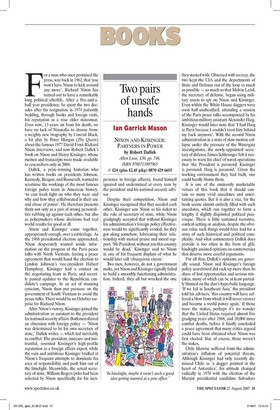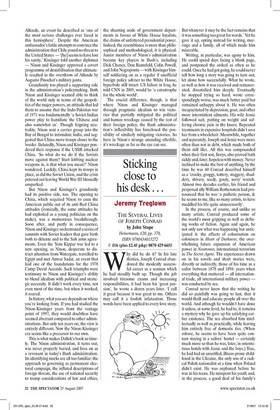Two pairs of unsafe hands
For a man who once promised the press, way back in 1962, that 'you won't have Nixon to kick around any more', Richard Nixon has turned out to have a remarkably long political afterlife. After a five-and-ahalf year presidency, he spent the two decades after his resignation in 1974 patiently building, through books and foreign visits, his reputation as a wise elder statesman Even now, 13 years on from his death, we have no lack of Nixonalia to choose from: a weighty new biography by Conrad Black, a hit play by Peter Morgan (The Queen) about the famous 1977 David Frost-Richard Nixon interviews, and now Robert Dallek's book on Nixon and Henry Kissinger, whose memos and transcripts were made available to researchers only in 2004.
Dallek, a prize-winning historian who has written books on presidents Johnson, Kennedy, Reagan, and Roosevelt, wanted to scrutinise the workings of the most famous foreign policy team in American history, 'to cast fresh light on who they were and why and how they collaborated in their use and abuse of power'. He therefore presents them not only as a pair of strong personalities rubbing up against each other, but also as policymakers whose decisions had real world results for good or ill.
Nixon and Kissinger came together, appropriately enough, over a subterfuge. As the 1968 presidential election approached, Nixon desperately wanted inside information on the progress of the Paris peace talks with North Vietnam, fearing a peace agreement that would hand the election to Lyndon Johnson's vice-president Hubert Humphrey. Kissinger had a contact on the negotiating team in Paris, and secretly passed updates to the Republican candidate's campaign. In an act of stunning cynicism, Nixon then put pressure on the government of South Vietnam to avoid the peace talks. There would be no October surprise for Richard Nixon.
After Nixon's victory, Kissinger joined the administration as assistant to the president for national security affairs. Both men shared an obsession with foreign policy — 'Nixon was determined to be his own secretary of state,' Dallek writes — which led inevitably to conflict. The president, insecure and mistrustful, resented Kissinger's high-profile reputation as a foreign affairs expert, while the vain and ambitious Kissinger bridled at Nixon's frequent attempts to dominate his area of responsibility and push him out of the limelight. Meanwhile, the actual secretary of state, William Rogers (who had been selected by Nixon specifically for his inexIan Garrick Mason NIXON AND KISSINGER: PARTNERS IN POWER by Robert Dallek Allen Lane, £30, pp. 740, ISBN 9780713997965 © £24 (plus £2.45 p&p) 0870 429 6655 perience in foreign affairs), found himself ignored and undermined at every turn by the president and his national security advisor.
Despite their competition, Nixon and Kissinger recognised that they needed each other. Kissinger saw Nixon as his ticket to the role of secretary of state, while Nixon grudgingly accepted that without Kissinger his administration's foreign policy effectiveness would be significantly eroded. So they got along somehow, lubricating their relationship with mutual praise and moral support. 'Mr President, without you this country would be dead,' Kissinger said to Nixon in one of his frequent displays of what he would later call 'obsequious excess'.
Two men, however, do not a government make, yet Nixon and Kissinger signally failed to build a smoothly functioning administration. Indeed, they all but wrecked the one they started with. Obsessed with secrecy, the two kept the CIA and the departments of State and Defense out of the loop as much as possible — so much so that Melvin Laird, the secretary of defense, began using military assets to spy on Nixon and Kissinger. Even within the White House daggers were soon half-unsheathed; attending a session of the Paris peace talks accompanied by his ambitious military assistant Alexander Haig, Kissinger would later note that 'I had Haig in Paris because I couldn't trust him behind my back anymore'. With the second Nixon administration in a state of slow-motion collapse under the pressure of the Watergate investigations, the newly-appointed secretary of defense James Schlesinger felt it necessary to warn his chief of naval operations that `the President is paranoid. Kissinger is paranoid. Haig is paranoid.' Given the working environment they had built, one could hardly blame them.
It is one of the eminently marketable virtues of this book that it should contain so many vivid anecdotes and entertaining quotes. But it is also a vice, for the book seems almost entirely filled with such anecdotes, which run together to form a lengthy if slightly disjointed political picaresque. There is little sustained narrative, context-setting or analysis, despite the obvious value such things would have had for a story of such historical and political complexity. And what commentary Dallek does provide is too often in the form of glib, hindsight-assisted opinions on controversies that deserve more careful arguments.
For all that, Dallek's opinions are generally sound. Nixon and Kissinger's foreign policy scoreboard did rack up more than its share of lost opportunities and serious mistakes, many of which can be at least partially blamed on the duo's hyperbolic language. 'If we fail in Southeast Asia,' the president told his advisers, 'this country will have suffered a blow from which it will never recover and become a world power again.' If those were the stakes, perhaps it's no wonder that the United States required almost five grudging years after 1968, and 20,000 more combat deaths, before it finally concluded a peace agreement that many critics argued could have been obtained when Nixon was first elected. But, of course, those weren't the stakes.
Chile likewise suffered from the administration's inflation of potential threats. Although Kissinger had only recently dismissed Chile as 'a dagger pointed at the heart of Antarctica', his attitude changed radically in 1970 with the election of the Marxist presidential candidate Salvadore Allende, an event he described as 'one of the most serious challenges ever faced in this hemisphere'. Despite the American ambassador's futile attempts to convince the administration that Chile posed no threat to the United States — `[hel seems to have lost his sanity,' Kissinger told another diplomat — Nixon and Kissinger approved a covert programme of destabilisation that ultimately resulted in the overthrow of Allende by Augusto Pinochet's military junta.
Grandiosity too played a supporting role in the administration's policymaking. Both Nixon and Kissinger seemed able to think of the world only in terms of the geopolitics of the major powers, an attitude that led them to assume that the Indo-Pakistan war of 1971 was fundamentally 'a Soviet-Indian power play to humiliate the Chinese and also somewhat us'. Though feigning neutrality, Nixon sent a carrier group into the Bay of Bengal to intimidate India, and suggested that China move troops closer to the border. Belatedly, Nixon and Kissinger pondered their response if the USSR attacked China. 'So what do we do if the Soviets move against them? Start lobbing nuclear weapons in, is that what you mean?' Nixon wondered. Luckily, China kept its troops in place, as did the Soviet Union, and the crisis petered out leaving World War III blessedly unsparked.
But Nixon and Kissinger's grandiosity had its positive side, too. The opening to China, which required Nixon to coax the American public out of its anti-Red China attitudes (ironically, the same attitudes he had exploited as a young politician on the make), was a momentous breakthrough. Soon after, and partly in consequence, Nixon and Kissinger orchestrated a series of summits with Soviet leaders that gave birth both to détente and to the Salt arms agreements. Even the Yom Kippur war led to a new opening, as Nixon, desperate to distract attention from Watergate, travelled to Egypt and met Anwar Sadat, an event that laid one of the foundations for the 1978 Camp David Accords. Such triumphs were testimony to Nixon and Kissinger's ability to blend idealism with political and strategic necessity. It didn't work every time, not even most of the time, but when it worked, it soared.
In history, what you see depends on where you're looking from. If you had studied the Nixon-Kissinger years from the vantage point of 1997, they would doubtless have seemed aberrant compared to other administrations. But only ten years on, the view is entirely different. Now the Nixon-Kissinger era seems like a precursor to our own.
This is what makes Dallek's book so timely. The Nixon administration, it turns out, was never properly buried, and lives on as a revenant in today's Bush administration. Its identifying marks are all too familiar: the approach to governing as permanent electoral campaign, the inflated descriptions of foreign threats, the use of national security to trump considerations of law and ethics, the shunting aside of government departments in favour of White House loyalists, the claims of unfettered presidential power. Indeed, the resemblance is more than philosophical and methodological, it is physical. Junior members of Nixon's administration became key players in Bush's, including Dick Cheney, Don Rumsfeld, Cohn Powell, and John Negroponte —with Kissinger himself soldiering on as a regular if unofficial foreign policy adviser to the White House, hyperbole still intact: US failure in Iraq, he told CNN in 2005, would be 'a catastrophe for the whole world'.
The crucial difference, though, is that where Nixon and Kissinger managed through pragmatic idealism to win victories that partially mitigated the political and human wreckage caused by the rest of their foreign policy, the Bush administration's inflexibility has foreclosed the possibility of similarly mitigating victories. So here in Nixon's strange unending afterlife, it's wreckage as far as the eye can see.










































 Previous page
Previous page